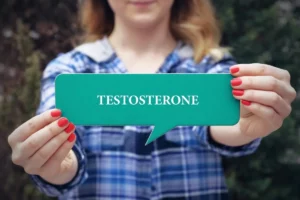As women journey through the various stages of life, menopause emerges as a significant milestone, accompanied by a multitude of physical and hormonal changes. Among these changes, the decline in testosterone levels can have profound implications for overall well-being. While testosterone is often associated with male health, its role in women’s health, particularly postmenopausal women, is increasingly gaining attention. In this blog, we will explore the intricacies of postmenopausal testosterone therapy, shedding light on its potential benefits and considerations for women seeking to enhance their vitality and quality of life.
Contents
Why Is Testosterone Given In Menopause?
 Testosterone is sometimes given in menopause to address the decline in hormonal levels that occurs during this stage of a woman’s life. While estrogen and progesterone are the primary hormones associated with menopause, testosterone also plays a crucial role in women’s health. Here are some reasons why testosterone may be given in menopause:
Testosterone is sometimes given in menopause to address the decline in hormonal levels that occurs during this stage of a woman’s life. While estrogen and progesterone are the primary hormones associated with menopause, testosterone also plays a crucial role in women’s health. Here are some reasons why testosterone may be given in menopause:
- Libido and Sexual Function: Declining testosterone levels during menopause can contribute to a decrease in libido (sexual desire) and changes in sexual function. Supplementing with testosterone may help improve these aspects, enhancing sexual satisfaction and overall well-being.
- Energy and Vitality: Testosterone is associated with energy levels and overall vitality. Some women may experience fatigue and a lack of energy during menopause, and testosterone therapy could potentially contribute to improved energy levels.
- Muscle Mass and Strength: Testosterone is involved in the maintenance of muscle mass and strength. Women experiencing muscle weakness or a decline in muscle mass during menopause may benefit from testosterone supplementation.
- Cognitive Function: Some studies suggest a potential link between testosterone levels and cognitive function. While the research is ongoing, there is interest in exploring whether testosterone therapy could have cognitive benefits for postmenopausal women.
- Mood and Well-being: Testosterone can influence mood, and low levels may be associated with feelings of irritability or low mood. Addressing hormonal imbalances through testosterone therapy may contribute to improved emotional well-being.
- Vaginal Health: Testosterone can have a positive impact on the health of vaginal tissues. Some women may experience dryness or discomfort in the vaginal area during menopause, and testosterone therapy may help alleviate these symptoms.
It’s important to note that the use of testosterone therapy in postmenopausal women is a topic of ongoing research and discussion. The decision to prescribe testosterone should be individualized.
How Does Postmenopausal Testosterone Therapy Work?
Postmenopausal testosterone therapy aims to address the decline in testosterone levels that occurs naturally during and after menopause in women. This therapy involves the administration of exogenous (external) testosterone to supplement the lower levels produced by the ovaries. Here’s an overview of how postmenopausal testosterone therapy works:
Hormone Levels Assessment
Before starting testosterone therapy, healthcare providers typically assess a woman’s hormone levels, including testosterone, through blood tests. This evaluation helps determine the extent of hormonal decline and guides the development of an individualized treatment plan.
Administration Methods
Testosterone therapy can be administered through various methods, and the choice often depends on factors such as the woman’s preferences, medical history, and healthcare provider recommendations. Common administration methods include:
- Transdermal Patches or Gels: These are applied to the skin, allowing for gradual absorption of testosterone into the bloodstream.
- Intramuscular Injections: Testosterone injections are administered into the muscle, providing a more sustained release of the hormone.
- Subcutaneous Pellets: Small pellets containing testosterone are implanted under the skin, releasing the hormone gradually over several months.
Individualized Treatment Plans
The dosage and form of testosterone prescribed vary based on individual needs and responses. Healthcare providers tailor treatment plans to address specific symptoms, optimize hormone levels, and minimize potential side effects.
Regular Monitoring
Women undergoing testosterone therapy are regularly monitored through follow-up appointments and blood tests. Monitoring allows healthcare providers to assess the effectiveness of the treatment, make necessary adjustments to the dosage, and address any potential side effects or concerns.
Potential Benefits
Postmenopausal testosterone therapy aims to alleviate symptoms associated with low testosterone levels, such as decreased libido, fatigue, mood changes, and changes in body composition. The therapy may contribute to improvements in sexual function, energy levels, mood, and overall well-being.
Complementary Lifestyle Measures
In conjunction with testosterone therapy, healthcare providers may recommend lifestyle modifications to enhance overall health. This may include regular exercise, a balanced diet, and other measures to support well-being during the postmenopausal stage.
Risks and Considerations
While many women may experience positive outcomes with testosterone therapy, there are potential risks and considerations. Side effects may include acne, oily skin, increased facial or body hair, and changes in cholesterol levels. The decision to undergo testosterone therapy should be based on a thorough evaluation of individual health status and a discussion of potential benefits and risks with a healthcare provider.
It’s crucial for women considering postmenopausal testosterone therapy to consult with a qualified healthcare professional. They can provide personalized guidance, monitor progress, and ensure the therapy’s safety and effectiveness.
How Much Testosterone Should a Menopausal Woman Take?
 The appropriate dosage of testosterone for a menopausal woman can vary based on individual factors, including the woman’s health status, symptoms, and response to the treatment. There is no one-size-fits-all answer to the question of how much testosterone a menopausal woman should take, as optimal levels can differ from person to person.
The appropriate dosage of testosterone for a menopausal woman can vary based on individual factors, including the woman’s health status, symptoms, and response to the treatment. There is no one-size-fits-all answer to the question of how much testosterone a menopausal woman should take, as optimal levels can differ from person to person.
Instead, healthcare providers typically follow a step-by-step process to determine the right dosage:
- Hormone Level Assessment
Before initiating testosterone therapy, healthcare providers conduct blood tests to measure hormone levels, including testosterone. These baseline assessments help identify the degree of hormonal decline and guide the development of an individualized treatment plan.
- Symptom Evaluation
The severity and nature of menopausal symptoms, such as decreased libido, fatigue, or mood changes, are considered when determining the appropriate dosage. The goal is to address specific symptoms while avoiding potential side effects.
- Start Low, Go Slow
It’s common for healthcare providers to start with a lower dosage of testosterone and gradually adjust it based on the woman’s response. This approach, often referred to as “start low, go slow,” helps minimize the risk of adverse effects while allowing for a careful assessment of the therapy’s impact.
- Regular Monitoring
Women undergoing testosterone therapy are regularly monitored through follow-up appointments and blood tests. Monitoring allows healthcare providers to assess the effectiveness of the treatment, make necessary adjustments to the dosage, and address any potential side effects or concerns.
- Safety Considerations
Healthcare providers prioritize safety when prescribing testosterone, considering factors such as age, overall health, and any pre-existing conditions. Monitoring for potential side effects, such as changes in cholesterol levels or acne, is essential.
It’s crucial for women considering testosterone therapy during menopause to consult with a qualified healthcare professional. A thorough discussion about symptoms, health history, and treatment goals will guide the development of an individualized plan.
Does Vitamin D Increase Testosterone In Females?
 Vitamin D is known to play a role in various physiological processes, and there is some evidence suggesting a potential link between vitamin D levels and testosterone in both men and women. However, the relationship between vitamin D and testosterone in females is complex, and more research is needed to fully understand the mechanisms and implications.
Vitamin D is known to play a role in various physiological processes, and there is some evidence suggesting a potential link between vitamin D levels and testosterone in both men and women. However, the relationship between vitamin D and testosterone in females is complex, and more research is needed to fully understand the mechanisms and implications.
Here are some points to consider:
- Limited Research in Females: While there is a relatively substantial body of research on the relationship between vitamin D and testosterone in men, studies specifically focusing on females are limited. The majority of research has been conducted on men, and extrapolating those findings to women should be done cautiously.
- Association, not Causation: Some studies have found associations between vitamin D levels and testosterone in women, suggesting that adequate vitamin D levels may be associated with higher testosterone levels. However, establishing a causal relationship is challenging, and other factors may influence these associations.
- Hormonal Balance: Vitamin D is believed to influence hormonal balance, and its receptors are found in various tissues, including the reproductive organs. Some studies have suggested that maintaining adequate vitamin D levels may support hormonal health in both men and women.
It’s important to note that vitamin D is not a direct hormone precursor like other vitamins involved in hormone synthesis. Instead, it influences the activity of enzymes and receptors involved in hormone production and metabolism. If you are considering vitamin D supplementation or have concerns about hormone levels, it is advisable to consult with a healthcare professional.
Conclusion
In conclusion, postmenopausal testosterone therapy holds promise for women seeking to improve various aspects of their well-being during this significant stage of life. By addressing the natural decline in testosterone levels, this therapy aims to enhance libido, energy levels, and overall vitality. While individual responses may vary, careful monitoring and personalized treatment plans, guided by healthcare professionals, can optimize the benefits and minimize potential risks.
Ultimately, the decision to explore postmenopausal testosterone therapy should be made collaboratively between women and their healthcare teams. Thus, taking into account individual health goals and considerations. If you are facing menopause related issues, menopause treatment at HerMantra can help. Book your free trial online menopause treatment session now.


